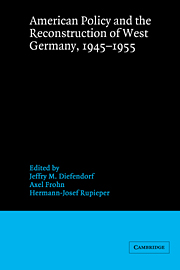Book contents
- Frontmatter
- 1 “Ripping Holes in the Iron Curtain”: The Council on Foreign Relations and Germany, 1945–1950
- 2 U.S. Policy on a West German Constitution, 1947-1949
- 3 American Policy toward German Unification, 1949-1955
- 4 Marshall Plan and Currency Reform
- 5 American Policy toward Germany and the Integration of Europe, 1945-1955
- 6 From Morgenthau Plan to Schuman Plan: America and the Organization of Europe
- 7 Return to Normality: The United States and Ruhr Industry, 1949-1955
- 8 West German Agriculture and the European Recovery Program, 1948-1952
- 9 Science, Technology, and Reparations in Postwar Germany
- 10 American Deconcentration Policy in the Ruhr Coal Industry
- 11 Technology Transfer and the Emergence of the West German Petrochemical Industry, 1945-1955
- 12 The Free University of Berlin: A German Experiment in Higher Education, 1948–1961
- 13 HICOG and the Unions in West Germany: A Study of HICOG’s Labor Policy toward the Deutscher Gewerkschaftsbund, 1949–1952
- 14 U.S. Military Occupation, Grass Roots Democracy, and Local German Government
- 15 German Democratization as Conservative Restabilization: The Impact of American Policy
- 16 America and the Rebuilding of Urban Germany
- 17 U.S. Policy toward German Veterans, 1945-1950
- 18 Grand Illusions: The United States, the Federal Republic of Germany, and the European Defense Community, 1950-1954
- 19 The Federal Republic of Germany as a “Battlefield” in American Nuclear Strategy, 1953-19
- 20 The Presence of American Troops in Germany and German-American Relations, 1949-1956
- 21 John J. McCloy and the Landsberg Cases
- 22 Sources in German Archives on the History of American Policy toward Germany, 1945-1955
- 23 U.S. High Commissioner for Germany and Related Records: Sources for the History of the Federal Republic of Germany, 1949–1955, in the U.S. National Archives and Records Administration
- Bibliography
- Index
23 - U.S. High Commissioner for Germany and Related Records: Sources for the History of the Federal Republic of Germany, 1949–1955, in the U.S. National Archives and Records Administration
Published online by Cambridge University Press: 05 January 2013
- Frontmatter
- 1 “Ripping Holes in the Iron Curtain”: The Council on Foreign Relations and Germany, 1945–1950
- 2 U.S. Policy on a West German Constitution, 1947-1949
- 3 American Policy toward German Unification, 1949-1955
- 4 Marshall Plan and Currency Reform
- 5 American Policy toward Germany and the Integration of Europe, 1945-1955
- 6 From Morgenthau Plan to Schuman Plan: America and the Organization of Europe
- 7 Return to Normality: The United States and Ruhr Industry, 1949-1955
- 8 West German Agriculture and the European Recovery Program, 1948-1952
- 9 Science, Technology, and Reparations in Postwar Germany
- 10 American Deconcentration Policy in the Ruhr Coal Industry
- 11 Technology Transfer and the Emergence of the West German Petrochemical Industry, 1945-1955
- 12 The Free University of Berlin: A German Experiment in Higher Education, 1948–1961
- 13 HICOG and the Unions in West Germany: A Study of HICOG’s Labor Policy toward the Deutscher Gewerkschaftsbund, 1949–1952
- 14 U.S. Military Occupation, Grass Roots Democracy, and Local German Government
- 15 German Democratization as Conservative Restabilization: The Impact of American Policy
- 16 America and the Rebuilding of Urban Germany
- 17 U.S. Policy toward German Veterans, 1945-1950
- 18 Grand Illusions: The United States, the Federal Republic of Germany, and the European Defense Community, 1950-1954
- 19 The Federal Republic of Germany as a “Battlefield” in American Nuclear Strategy, 1953-19
- 20 The Presence of American Troops in Germany and German-American Relations, 1949-1956
- 21 John J. McCloy and the Landsberg Cases
- 22 Sources in German Archives on the History of American Policy toward Germany, 1945-1955
- 23 U.S. High Commissioner for Germany and Related Records: Sources for the History of the Federal Republic of Germany, 1949–1955, in the U.S. National Archives and Records Administration
- Bibliography
- Index
Summary
With the proclamation of the Basic Law on May 23, 1949, and its effectuation by the promulgation of the Occupation Statute on September 21, military government came to an end in Western (“Trizonia”) Germany. There began an interim of semisovereignty for the Bundesrepublik Deutschland (Federal Republic of Germany, FRG) under the Occupation Statute, supervised jointly by the Allied High Commission (AHC) for Germany, consisting of high commissioners for Germany from France, Great Britain, and the United States. During the several stages between September 1, 1949, and May 5, 1955, when restrictions on sovereignty were all but lifted by proclamation of the AHC, culminating in the replacement of the high commissioners by ambassadors, by reason of its overwhelming economic and military power the United States played a decisive role in determining the pace and limits of progress toward near emancipation. Consequently, the records of the U.S. federal government deposited in the National Archives and Records Administration (NARA), second only to those deposited in the Bundesarchiv in Koblenz and Freiburg/Breisgau, and the German Foreign Office Archives in Bonn, are a major source for the study of the history of the Federal Republic of Germany between 1949 and 1955. It should be noted, however, that the progressive reduction of direct Allied activity from operations to mere observation, advice, and assistance with only an occasional direct intervention, contributed to much reduced paperwork and thus, a smaller archival residue.
- Type
- Chapter
- Information
- Publisher: Cambridge University PressPrint publication year: 1994



